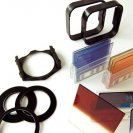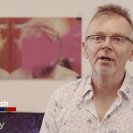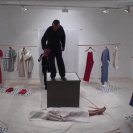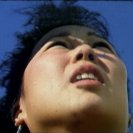Mark Titmarsh was born in 1955, Ingham, Queensland, Australia.
In addition to a PhD awarded by the University of Technology, Sydney in 2009 Titmarsh holds a number of graduate and undergraduate degrees including a BA in Law [Queensland University], a BA in Visual Arts [College of Fine Arts, University of NSW] and Master of Visual Arts Painting [Sydney College of the Arts, University of Sydney].
Since 1980 Titmarsh has worked extensively as an artist, filmmaker, visual artist, writer, lecturer and curator. He was a founding member of the Sydney Super 8 Collective [later the Sydney Super 8 Film Group] in 1983 and was instrumental in the organisation of the group’s annual festivals and publications. Titmarsh wrote extensively on the emerging 1980s Australian film scene for various magazines, journals and other publications, promoting and proselytising Super 8 filmmaking. In 1983 Titmarsh co-founded and edited On the Beach, a key journal in the emergence of critical theory in Australia. Titmarsh also curated and toured programs of Australian Super 8 filmmaking to Europe and the United States during the 1980s.
Titmarsh’s work across all his chosen mediums, from film and painting, to sculpture and performance, has been concerned at some level with the potential of those mediums to be expanded and hybridised into new conceptual configurations. Early work in Super 8 such as Forbidden Planet [1981], City of Women [1982] and Night of the Living Dead [1983] involved re-enactments of portions of the plots of the films from which their titles had been lifted. Titmarsh’s emphasis in these films was to recontextualise purloined plot elements into loose, collage-like narratives that featured performances by non-actors [friends, colleagues, other filmmakers] and visual and audio elements taken directly from the mainstream art house and Hollywood films by means of refilming these elements from a television screen. Titmarsh experimented with this mixture of original and appropriated material throughout the following decade with such films such as Imitation of Life [1984], Shock Corridor [1985], Legion [1985], 35 Summers [1988] and the video work Viva [1989].
Titmarsh also experimented with films consisting entirely of appropriated material. This Is The Way That Jack Dies [1985] was made from scenes in films in which the actor Jack Palance “dies” - a taxonomic study of film performance and technique. In 1987 Titmarsh coined the term “Metaphysical TV” to describe the work of five filmmakers – Titmarsh, Andrew Frost, Michael Hutak, Gary Warner and Stephen Harrop – whose work investigated a relationship with the televisual image via film. Titmarsh curated a film program of ‘MTV’ films, wrote the group’s manifesto, and toured the program internationally in 1988-89.
Towards the end of the 1980s Titmarsh began to exhibit his paintings and sculptures in commercial and artist-run galleries and, from 1989 until 1998, concentrated solely on these studio practices. In 1998 Titmarsh returned to film with a series of short, looped Super 8 works such as Nietzsche Loop and Pyramid Loop, developing and extending interests in colour and composition arising from his painting practice. In the last decade Titmarsh has explored these ideas further with a series of video works including RNR [2004], and RXP [2005]. In 2007 Titmarsh exhibited five video works – Flowerpower, Wetpaint, Waterworld, I Am and Resonance [all 2005] under the collective title Deep Wallpaper at the Pompidou Centre, Paris. Titmarsh’s most recent screen works include (Silly) String Theory [2008] and Chromophiliac [2011].
Further Reading:
Mark Titmarsh - Perspecta 1989
Mark Titmarsh - Artist Statement Essay 1988
Mark Titmarsh - 35 summers Press release 1987
'24 Years for 25 Exhibitions', Bruce Barber, Broadsheet, March 2009, Vol 38.1.
'dLux and the super history of Super 8 in Sydney', Bob Perceval, Real Time No. 77, Feb-Mar, 2007
'Intelligent Dolphins: From Metaphysical TV to Remix Culture', Andrew Frost, SynCity Catalgoue, dLux Media Arts, Sydney, 2006.
'Straight Roads and Crossed Lines, The Quest for Film Culture in Australia', Barrett Hodsdon, Bernt Porridge, Perth, 2001.
'Simply Super 8', Ross Harley, HQ, July-Aug 1999.
'Film and Video of the 1980s', Adrian Martin, in What is Appropriation? Rex Butler (ed.), IMA, Brisbane, 1996.
'Collage in contemporary Australian Film', Adrian Martin, in Contemporary Australian Collage, Sydney, Craftsman House, 1990.
'Yes and No - An Interview with Mark Titmarsh',Michael Hutak, Tension, October 1989.
'Indefinite Objects', Adrain Martin, in Albert Moran and Tom O’Regan (eds.), The Australian Screen, Penguin, Sydney, 1989.
'Where are they now?' Sean O'Brien, Acme, Sydney, 1989.
'Bright Sparks', Catherine Raphaely, ID Magazine, London, February 1988,/p> 'Un armonica parentesco', Marianella Balbi, El Nacional, 24 August, 1988, Caracas Venezuela.
'Metaphysical TV',Anne Marie Crawford, Filmviews, 132, Winter 1987.
'Review of New Australian Super 8',Amanda Lipman, City Limits, London, 26 June - 3 July
'Legion Reviewed',Nadine Myatt, Filmviews 128, Winter 1986.
'Virtually There: Super 8', Edward Colless, Australian Perspecta 1985 Catalogue, Art Gallery of NSW, October 1985.
'My Life Goes to the Movies,' Adrian Martin, On the Beach 3/4, Autumn 1984. 'The Spectacle of the Festival', Meaghan Morris, Australian Financial Review, 16 June, 1984.
'Disappointments, Delights and Bums on Seats', Ross Gibson, Filmnews, November/December 1983.

















